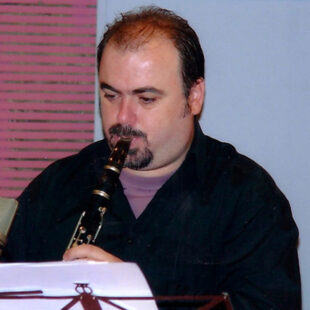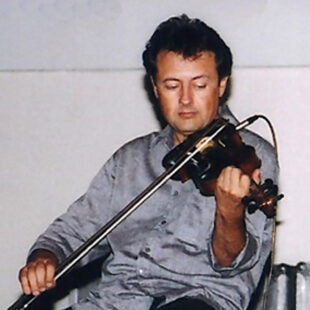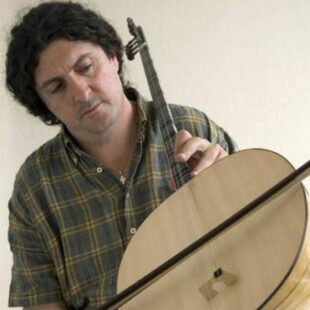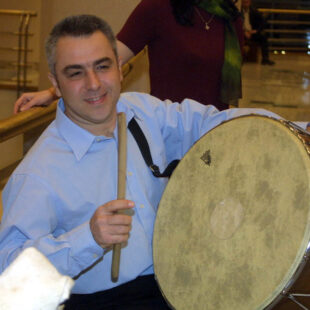00:00
Home / Her Work / Song Catalogue / I Gave up All I Had & What’s Wrong, Theonitsa?
I gave up all I had, all the joys life gave me,
and now walk hand in hand with my humility.
It’s you that torments me, but what can I say?
I love you so much, and that’s how I pay.
I sigh and hurt and weep and mourn;
I see birds on the wing, but why aren’t mine airborne?
In Agios Konstantinos, such a pretty sight
your love will give me: the gift of flight.
Count your stars at night and, if a pair should vanish,
ask me and I’ll tell you which thief to banish.
You’re a sun, a moon glowing bright;
you dazzled me so, I’ve lost my sight.
“What’s wrong, Theonitsa? You weep the day through;
but won’t you tell your Nan what it is that ails you?”
“What can I say, Gran, what tale can I tell?
You know nothing of love’s hidden sorrow, its spell”.
Translated by Michael Eleftheriou
Όλα μου τα παράτησα και τη μερακλοσύνη,
και περπατώ σιγά σιγά με την ταπεινοσύνη.
Εσύ με βασανίζεις, μα τι μπορώ να πω,
όλα τα υποφέρω, γιατί σε αγαπώ.
Αναστενάζω και πονώ και κλαίω και λυπούμαι,
του κόσμου τα πουλιά θωρώ και το δικό μου πού ’ναι.
Στον Άγιο Κωσταντίνο νερό τρεχάμενο,
η αγάπη σου με κάνει πουλί πετάμενο.
Μέτρησε, νύχτα, τ’ άστρα σου κι αν λείπει ένα ζευγάρι,
ρώτησε μένα να σου πω ποια κλέφτρα σ’ το ’χει πάρει.
Εσύ ’σαι ένας ήλιος, φεγγάρι λαμπερό,
που θάμπωσες το φως μου και δεν μπορώ να δω.
«Τι έχεις, Θεωνίτσα, νύχτα και μέρα κλαις,
και μένα της νενές* σου γιατί δε μου το λες;»
«Τι να σου πω, νενέ μου, τι να σου διηγηθώ;
Δεν ξέρεις απ’ αγάπη κι από κρυφό καημό».
*νενέ: η γιαγιά (τουρκ. nene)
Two songs from Asia Minor sung to the rhythm of the syrtos dance. The first melody was widespread around the Sea of Marmara, where it was sung with minor musical variations on the Kyzikos peninsula, the Marmara Islands, Moudania and its environs, the coastal villages of Nicomedia, the Thracian shores of Silyvria and Raidestos, and elsewhere — even travelling as far afield as the Aegean islands (Ξύπνα, διαμάντι και ρουμπλί [Wake up, Diamond and Ruby], for example, from the Dodecanese).
The fifteen-syllable couplets, accompanied by thirteen-syllable tsakismata, are romantic in nature, expressing —modestly, comprehensively, and with poetic precision— the sorrow of love lost or unfulfilled. Other versions include couplets that exhort the listeners to dance or praise good dancers (e.g. Σηκώστε να χορέψουμε, να φύγουνε τα ντέρτια [Get up to Dance and Banish your Sorrows]). Many, like the three couplets included here, are remarkable examples of vernacular poetry.
Theonitsa’s song was first sung around the Sea of Marmara, among the dozens of coastal hamlets inhabited by Thracians and Greeks from the Asia Minor seaboard. However, the song appears with various lyrical and onomastic variations (Theonitsa, Theanitsa, Theofanitsa, Dionitsa, etc.) throughout the Aegean and as far away as Cyprus.
It was most likely inspired by a real and tragic event: a maid falls in love with someone she is forbidden to love — either due to a blood relation or her family’s disapproval. When she confesses her feelings, they kill her. In other versions, the girl dies by falling —perhaps in despair— because her family refuses the marriage. Wherever the event took place, it deeply shocked the local community and was transformed into song, spreading far and wide due to its emotional power and tragic content.
In his monumental 260 Demotic Greek Melodies (Athens, 1905), Georgios Pachtikos mentions an almost complete variation from the Greek village of Kontzes near Nicomedia (pp. 153–155).
Theodor Kondaras (2022)
Live recording from the concert Songs of Asia Minor with Domna Samiou, held on 8 March 2005 at the Megaron —
the Athens Concert Hall. Based on Simon Karas’ recording which belongs to the Association for the Dissemination of Greek National Music.

Singers

Clarinet

Violin

Bowed tambouras

Constantinopolitan lute

Lute

Goblet drum

Bendir (frame drum)